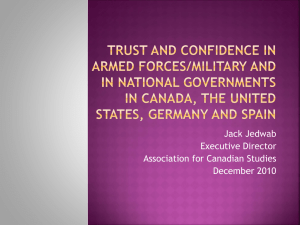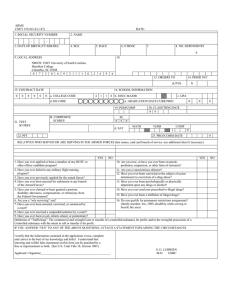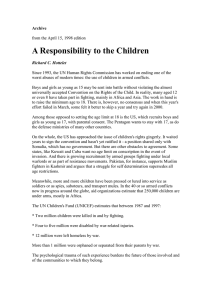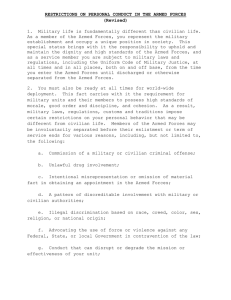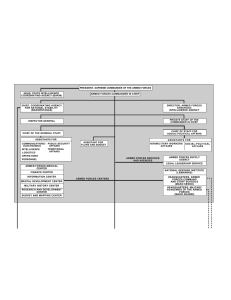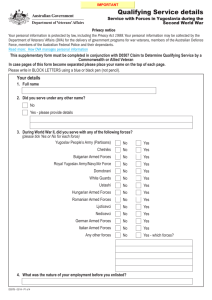Item 6 - Armed Forces Community Covenant
advertisement
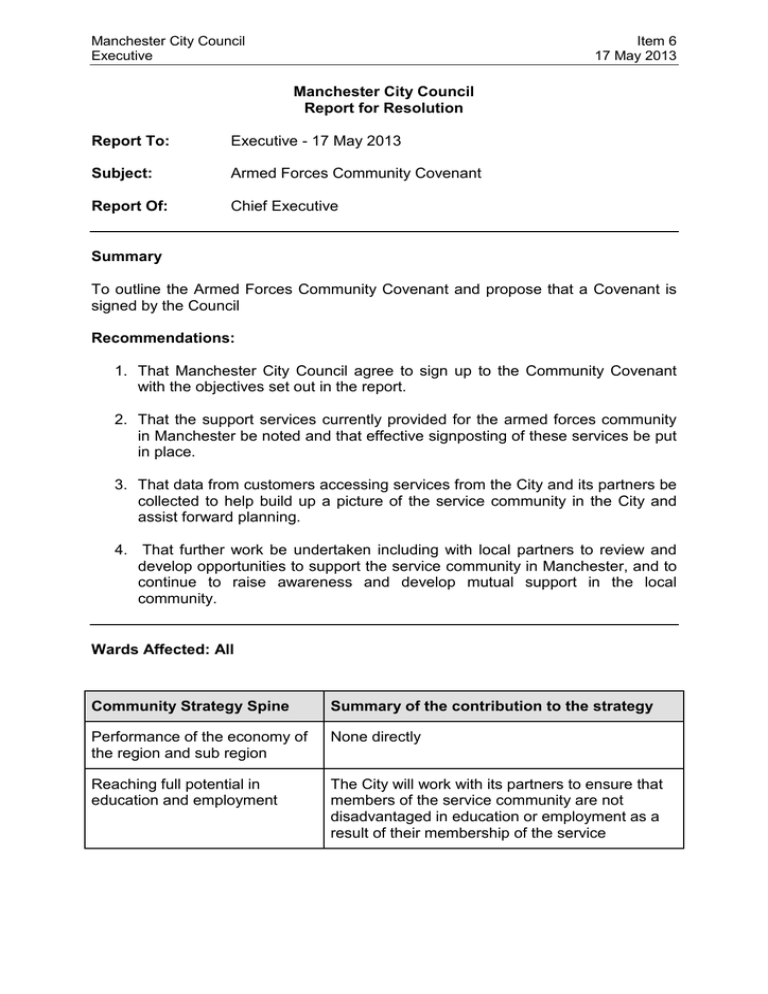
Manchester City Council Executive Item 6 17 May 2013 Manchester City Council Report for Resolution Report To: Executive - 17 May 2013 Subject: Armed Forces Community Covenant Report Of: Chief Executive Summary To outline the Armed Forces Community Covenant and propose that a Covenant is signed by the Council Recommendations: 1. That Manchester City Council agree to sign up to the Community Covenant with the objectives set out in the report. 2. That the support services currently provided for the armed forces community in Manchester be noted and that effective signposting of these services be put in place. 3. That data from customers accessing services from the City and its partners be collected to help build up a picture of the service community in the City and assist forward planning. 4. That further work be undertaken including with local partners to review and develop opportunities to support the service community in Manchester, and to continue to raise awareness and develop mutual support in the local community. Wards Affected: All Community Strategy Spine Summary of the contribution to the strategy Performance of the economy of the region and sub region None directly Reaching full potential in education and employment The City will work with its partners to ensure that members of the service community are not disadvantaged in education or employment as a result of their membership of the service Manchester City Council Executive Item 6 17 May 2013 Individual and collective self esteem – mutual respect An objective of the Community Covenant is to raise awareness of the Armed Service community, promote understanding and encourage support between the service and civilian communities Neighbourhoods of Choice None directly Implications for: • • • Equal Opportunities Policy - Yes Risk Management - No Legal Considerations - No Financial Consequences – Revenue and Capital None Contact Officers: Name: Position: Telephone: E-mail: Marilyn McGuinness Executive Assistant 0161 234 3249 m.mcguinness@manchester.gov.uk Background documents (available for public inspection): The following documents disclose important facts on which the report is based and have been relied upon in preparing the report. Copies of the background documents are available up to 4 years after the date of the meeting. If you would like a copy please contact one of the contact officers above. MOD/LGA Letter of October 2013 www.mod.uk/covenant British Legion Best Practice Guide to Community Covenants Manchester City Council Executive Item 6 17 May 2013 1.0 Introduction 1.1 The Armed Forces Covenant was published by Government in May 2011. This outlined the moral obligation between the Nation, the Government and the Armed Forces and set out the general principles that should govern their relationship. One of the key elements of the Covenant was the launch of a Community Covenant scheme. 1.2 Community Covenants are intended to complement the Armed Forces Covenant at a local and regional level. A Community Covenant is a voluntary statement of mutual support between a civilian community and its local Armed Forces Community, which is defined as serving personnel, veterans and their families. The aim is to encourage communities to support their local service community in a tangible way, and vice versa. 2.0 The Armed Forces Community in Greater Manchester and the NW. 2.1 The Armed Forces community comprises regular and reserve service personnel both serving and veterans and their families. There is no precise data on the Armed Forces community with homes or with families in the city. However, the region is a major recruiting ground for the services and a proportion of those involved are likely to live and/or have family in the City. The armed forces community can be viewed in the following four cohorts: those before service, those in service, those transitioning from service and those after service veterans. Information currently available is as follows. Pre-service: o About 20% of the Army is recruited from the North West from 11% of the population. The position is similar for both the RN and RAF; o There are 6,700 Army Cadets in the region, of which 1,400 are in 47 detachments in Greater Manchester; o The Army conducts a series of national, regional and local youth outreach programmes with a number of partners. In Service: o If about 20% of the Army is recruited from the North West, when they join their units, their families likely remain in the region; o There are about 5,000 servicemen, regular and active reserve, stationed in the North West. In Greater Manchester there are no regular units but there are eight TA units, including one in Manchester. With their families they make up a population of about 3,000. Transition from service: o If about 20% of the Army is recruited from the North West, then about the same number may return to the area post service. Transition out of the Armed Forces is a critical process to get right and needs local support. o Evidence indicates about 92% of servicemen find employment, accommodation and make the early transition to civilian life without issue within 6 months of discharge. Effective support from the Armed Forces, public service providers, military charities and the community is essential in facilitating successful transition. Manchester City Council Executive Item 6 17 May 2013 o A minority encounter difficulty which has a human cost, a reputational cost and a real cost in terms support services. Measures to ensure that vulnerable ex service personnel are identified and supported at an early stage are therefore essential. This group may be more complex due to redundancy over the next few years. Post Service: Veterans: o The number of veterans in the North West is not known but if there are about 5 million veterans in the UK today, then it probably isn’t less than 500,000; and if the region recruits up to 20% of the three services, then it could be upward of 1M. o Most Veterans make the transition without issue; but a small but important minority will struggle and be vulnerable. o The veterans community is complex and changing, including 70 year old Korean War veterans, 50 year old Falklands Veterans and 24 year old Afghanistan veterans, all with different experiences and needs. 3.0 The Community Covenant 3.1 The aim of the Community Covenant Agreement is to build on existing relationships and service provision in order to avoid disadvantage to the armed service community and to promote the continued development of a reciprocal arrangement between the local service and civilian communities. 3.2 The Local Authority and the local armed forces community are encouraged to work together to establish a Community Covenant in order to:• • • • • 3.3 encourage local communities to support the Armed Forces community in their area, promote understanding and raise awareness of issues affecting the Armed Forces Community; encourage activities that help to integrate the Armed Forces into local life; recognise and remember the sacrifices faced by the Armed Forces community; encourage the Armed Forces community to help and support the wider community, whether through participation in events and joint projects or other forms of engagement; raise awareness of local services provided by the council, partners and the voluntary sector in the City. Community Covenants are not intended to be identikit documents but should reflect local circumstances. However, some of the issues for the Armed Forces community that should be considered as part of signing up to a Community Covenant include: - housing, including access to affordable properties & social housing and home adaptations - employment support - health and social care - education and skills - leisure and libraries Manchester City Council Executive Item 6 17 May 2013 - information and advice 3.4 Some examples of practical measures being taken in other areas include: dedicated web pages providing information for the armed forces and signposting to service providers; support for ex - service personnel re-enter the jobs market; dedicated housing support staff; allowing base addresses to be used for school applications; developing records of the local armed service community; and community projects eg local history. 3.5 The Community Covenant is also supported by the Community Covenant Grant Scheme (£30M over 4 years nationally) which delivers financial support for local community projects to strengthen ties or mutual understanding between members of the armed forces community and the wider community in which they live. Successful projects in other areas include a community youth group, a scheme for training volunteers and an Armed Forces history club. 4.0 The City Council and the Armed Services 4.1 The Council has had a close working relationship with the local armed services community, the Royal British Legion and others over many years, particularly in relation to our role in co-ordinating the Remembrance Sunday commemoration, the annual Armed Forces Day celebration and other civic events. The Council has also recognised the role and contribution of the armed services by conferring Freedom of Entry to the City to 207 (Manchester) Field Hospital (Volunteers) in October 2011 and previously to the Duke of Lancaster’s Regiment in July 2007. The Council has also appointed a lead member for the Armed Forces in Manchester, Councillor Judge and the Council’s Strategic Director for Families Health and Wellbeing, will act as the lead officer for the Community Covenant, supported by the Chief Executive’s Office. 4.2 The City Council and its partners provide a range of services that can be accessed by the armed forces community. As part of the Covenant, it is proposed that provision will be reviewed and developed where appropriate, with our partners. Some of the key services currently provided are summarised in the appendix. 5.0 Recommendations 5.1 Following discussions including the lead member and representatives of the local Armed Services and the RBL, it is recommended:(i) (ii) (ii) (iii) that Manchester City Council agree to sign up to the Community Covenant with the objectives set out above; that the support services currently provided in Manchester be noted and that effective signposting of these services be put in place; that data from customers accessing services from the City and its partners be collected to help build up a picture of the service community in the City and assist forward planning; that further work be undertaken with key local partners to review and Manchester City Council Executive Item 6 17 May 2013 develop opportunities to support the service community in Manchester; and to continue to raise awareness and develop mutual support in the local community. Manchester City Council Executive Appendix - Item 6 17 May 2013 APPENDIX: Support for serving personnel, veterans and their families Health and Social Care The Greater Manchester Local Area Team of NHS England will have the lead responsibility for ensuring that the Armed Forces covenant and associated commitments are delivered. This includes core requirements in new contracts for the provision of primary care services and increasing and improving access to mental health services. NHS England are represented on the Manchester Health and Wellbeing Board (H&WB) along with all NHS organisations commissioning and delivering services in the City. The Council's Strategic Director for Families Health and Wellbeing, who is the lead for the Community Covenant, is also a member of the H&WB. The Board is therefore ideally placed to ensure joint work across health and social care meets the needs of armed services community in the City. Housing The Council's Allocations Scheme, which determines access to social housing, both Council stock and through nomination agreements with Registered Providers, prioritises Armed Forces Personnel with a local connection. Any applicant who needs to move to suitable adapted accommodation because of a serious injury, medical condition or disability which he or she, or a member of their household, has sustained as a result of service in the UK Armed Forces can be awarded Band 1, the highest priority under the Allocations Scheme. This applies where the applicant’s current accommodation does not meet the requirements of the occupants in terms of adaptations. Education School Admissions: national guidelines apply. This group is not automatically a priority group but must be given a school place on notification of them moving into the area. Where there is no place available the group are considered as an exception to infant class size and we would allocate to a school over numbers if necessary at Key Stage 1. Local arrangements do not specifically relate to this group but this could be considered. Employment Signposting and supporting ex service personnel to access work in the City through the Employer Suite and other local employment initiatives. Within the Council, apprentice recruitment supports targeted individuals - could consider extending to veterans; also pre-employment training. Community and Cultural Services Generic services available to all residents. As part of the emerging Covenant, review access to leisure provision and also opportunities through the volunteering bureau through signposting individuals to specific training, development and volunteering opportunities in the community using existing skills and experience and helping the move towards future career options Financial Advice and Support The Customer Services Team will provide support and guidance to returning armed forces personnel/customers who are seeking information and advice on what financial support maybe available through the welfare benefits system based on their circumstances and provide them with assistance in completing their application if they are eligible. In service: Local discretion to fully discount Council Tax charges for properties left unoccupied by armed forces personnel in the course of their duties eg. overseas posting. Manchester City Council Executive Appendix - Item 6 17 May 2013 Post service: In the new Council tax Support Scheme; the Council will continue to disregard war disablement pensions and pensions for war widows and widowers when working out entitlement to housing benefit and council tax benefit.
